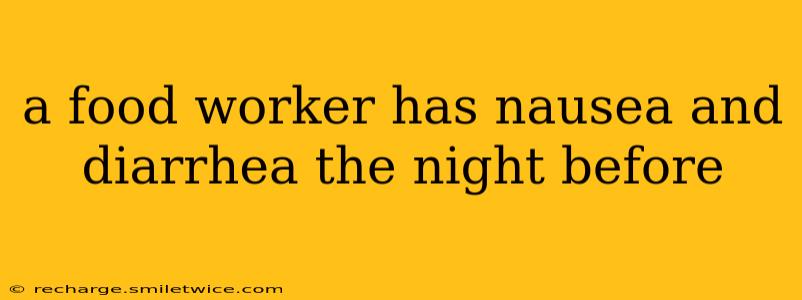Working in the food industry demands a high level of responsibility, especially when it comes to maintaining hygiene and preventing foodborne illnesses. Feeling unwell, particularly with symptoms like nausea and diarrhea, presents a significant challenge. The question isn't just about personal discomfort; it's about protecting the health and safety of others. This guide explores what to do if you're a food worker experiencing nausea and diarrhea the night before your shift.
What Should a Food Worker Do if They Have Nausea and Diarrhea?
The most crucial step is staying home. Even if you feel slightly better in the morning, the risk of contaminating food and surfaces is too high. Nausea and diarrhea are classic symptoms of food poisoning and other gastrointestinal illnesses, which are highly contagious. Working while experiencing these symptoms puts your coworkers and customers at serious risk. Your employer likely has a policy requiring you to stay home when sick. Review your workplace's policy to understand your specific obligations.
How Long Should a Food Worker Stay Home After Nausea and Diarrhea?
There's no single magic number of days to stay home. The duration depends entirely on the severity of your symptoms and your overall health. As a general rule, you should stay home until you're symptom-free for at least 24 hours. This means no nausea, vomiting, diarrhea, or fever. If your symptoms persist beyond a day or two, consult a doctor. They can diagnose the cause of your illness and advise you on when it's safe to return to work.
What are the Risks of Working While Sick?
The risks associated with working while experiencing nausea and diarrhea are substantial. You could unintentionally contaminate food preparation surfaces, utensils, and food itself, leading to a foodborne illness outbreak. This can result in significant health consequences for your customers, damage to your employer's reputation, and potential legal repercussions. The potential consequences far outweigh any perceived inconvenience of taking a day or two off.
Can a Food Worker Take Medication and Still Work?
Taking medication to alleviate symptoms does not make it safe to work. Over-the-counter medications may temporarily mask symptoms, but they don't eliminate the risk of spreading the illness. The underlying infection remains, and you could still contaminate food and surfaces. Your best course of action is to recover fully before returning to your job.
What if a Food Worker Has Mild Symptoms?
Even mild symptoms like slight nausea or infrequent loose stools warrant staying home. It's crucial to err on the side of caution. The potential for spreading illness is still present, and the consequences of a foodborne illness outbreak can be severe.
How to Report Illness to Your Employer?
Most workplaces have established procedures for reporting illness. Contact your supervisor or manager as soon as possible to inform them of your condition and your inability to work. Follow their instructions regarding sick leave policies and reporting procedures.
When is it Safe to Return to Work After Nausea and Diarrhea?
Again, the key is to be completely symptom-free for at least 24 hours. This means no diarrhea, no vomiting, no fever, and no significant nausea. If you've had a doctor's visit, follow their recommendations. Returning to work prematurely puts yourself and others at risk.
By prioritizing safety and following these guidelines, food workers can contribute to a healthier and safer work environment for everyone. Remember, protecting public health is paramount.
